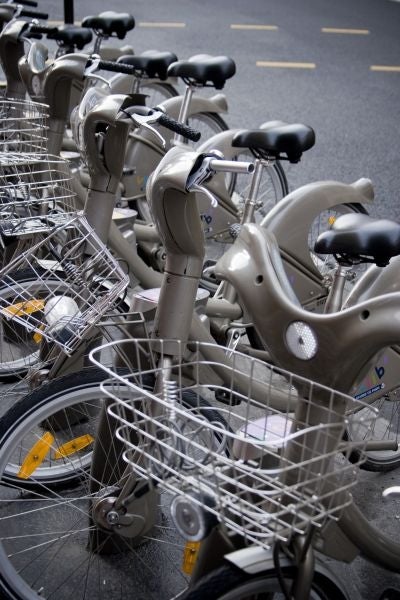New York will vote on the implementation of a bike-sharing scheme on July 22, making it the latest city to promote pedal power, but cycling in large cities could have hidden health risks.
A bike-sharing scheme, similar to the Velib in Paris or Cyclocity in Japan, has been proposed for New York.
The scheme was suggested by entrants into online social media competition YOXI, who were asked, ‘how to encourage biking in New York.' Entrants proposed that New York car-sharing firm Zip Car extend its services to bikes. The winning team by public vote will be selected at 11:59pm ET on Thursday, July 22.
If bike sharing is implemented as a means to encourage cycling in the city, New York will become the latest in a long line of cosmopolitan centers to implement such a scheme. However despite the success of bike-sharing ventures such as the Paris Velib, launched in 2007, concerns are being raised over the health benefits of cycling in large cities.
Beijing, China, once renowned for the popularity of bicycles amongst its residents, is suffering from a decline in cyclists due to increased pollution levels and a rise in motorists. In an effort to reduce the number of motorists and boost cycling, 50,000 bikes will be made available for public hire in the state capital by 2015.
However pollution levels across the world's cities are likely to discourage cyclists. A study released in June by the Transport Research Institute at Hasselt University in Brussels revealed that cyclists inhale around five times more toxic nanoparticles than pedestrians or car drivers; these toxic nanoparticles have been linked to heart disease and increased susceptibility to asthma attacks.
Comparing levels of pollution and bike-hire schemes across international cities, London (UK), Melbourne (Australia), Mexico City (Mexico), Paris (France) Toronto (Canada), Toyama (Japan) and New York (USA), the latest data from the World Bank suggests that on average the level of air pollution was highest in Beijing and lowest in Paris.
The 2004 report by the World Bank, looking at particle matter per cubic meter, with particle matter defined as particles ‘capable of penetrating the respiratory tract and causing significant health damage,' indicates the most polluted cities with bike-sharing schemes are:
Beijing: 89 micrograms of particle matter per cubic meter
Mexico City: 51 micrograms
Tokyo: 40 micrograms (data for Toyama was not available).
Toronto: 22 micrograms
London: 21 micrograms
New York: 21 micrograms
Melbourne: 12 micrograms
Paris: 11 micrograms
However if bike-sharing schemes such as the one proposed in New York gain popularity they are a means to reducing car traffic, congestion and pollution.
Subscribe to Independent Premium to bookmark this article
Want to bookmark your favourite articles and stories to read or reference later? Start your Independent Premium subscription today.


Join our commenting forum
Join thought-provoking conversations, follow other Independent readers and see their replies